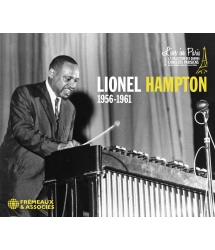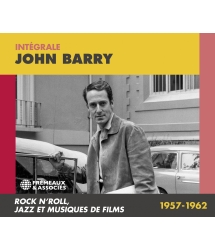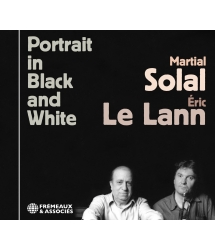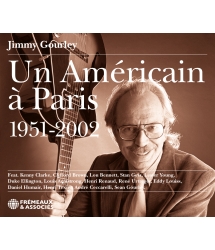- Our Catalog
- Philosophy
- Philosophers of the 20th century and today
- History of Philosophy (PUF)
- Counter-History and Brief Encyclopedia by Michel Onfray
- The philosophical work explained by Luc Ferry
- Ancient thought
- Thinkers of yesterday as seen by the philosophers of today
- Historical philosophical texts interpreted by great actors
- History
- Books (in French)
- Social science
- Historical words
- Audiobooks & Literature
- Our Catalog
- Jazz
- Blues
- Rock - Country - Cajun
- French song
- World music
- Africa
- France
- Québec / Canada
- Hawaï
- West Indies
- Caribbean
- Cuba & Afro-cubain
- Mexico
- South America
- Tango
- Brazil
- Tzigane / Gypsy
- Fado / Portugal
- Flamenco / Spain
- Yiddish / Israel
- China
- Tibet / Nepal
- Asia
- Indian Ocean / Madagascar
- Japan
- Indonesia
- Oceania
- India
- Bangladesh
- USSR / Communist songs
- World music / Miscellaneous
- Classical music
- Composers - Movie Soundtracks
- Sounds of nature
- Our Catalog
- Youth
- Philosophy
- News
- How to order ?
- Receive the catalog
- Manifesto
- Dictionnary











- Our Catalog
- Philosophy
- Philosophers of the 20th century and today
- History of Philosophy (PUF)
- Counter-History and Brief Encyclopedia by Michel Onfray
- The philosophical work explained by Luc Ferry
- Ancient thought
- Thinkers of yesterday as seen by the philosophers of today
- Historical philosophical texts interpreted by great actors
- History
- Books (in French)
- Social science
- Historical words
- Audiobooks & Literature
- Our Catalog
- Jazz
- Blues
- Rock - Country - Cajun
- French song
- World music
- Africa
- France
- Québec / Canada
- Hawaï
- West Indies
- Caribbean
- Cuba & Afro-cubain
- Mexico
- South America
- Tango
- Brazil
- Tzigane / Gypsy
- Fado / Portugal
- Flamenco / Spain
- Yiddish / Israel
- China
- Tibet / Nepal
- Asia
- Indian Ocean / Madagascar
- Japan
- Indonesia
- Oceania
- India
- Bangladesh
- USSR / Communist songs
- World music / Miscellaneous
- Classical music
- Composers - Movie Soundtracks
- Sounds of nature
- Our Catalog
- Youth
- Philosophy
- News
- How to order ?
- Receive the catalog
- Manifesto
- Dictionnary
avec YAYO REINHARDT et FANTO REINHARDT
ROMANE
Ref.: FA545
EAN : 3448960254526
Artistic Direction : Augustin Bondoux et Patrick Frémeaux
Label : Frémeaux & Associés
Total duration of the pack : 39 minutes
Nbre. CD : 1
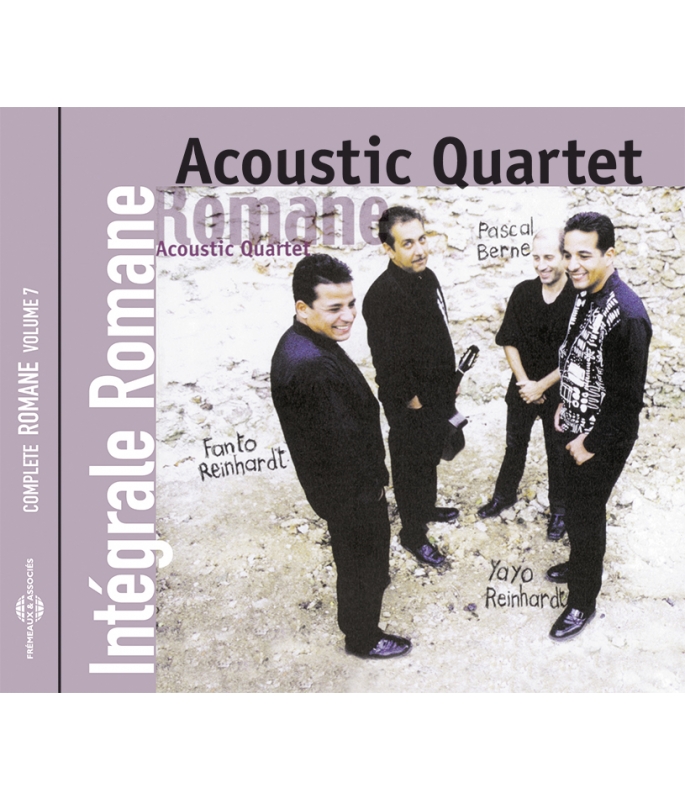
avec YAYO REINHARDT et FANTO REINHARDT
avec YAYO REINHARDT et FANTO REINHARDT
Romane is a leading figure among those who, at the dawn of the 2000s, put their seal on the gypsy jazz renaissance. The evolution of this music owes much to his discography, and his compositions have become classics in the genre. On Acoustic Quartet, Romane is royally assisted by the brothers Yayo and Fanto Reinhardt, who lay down the metronome-steady beat the French call “the pump”, and by Pascal Berne on double bass, whose sense of swing is second to none. On guitar, Romane has a free hand to apply his virtuoso touch and feeling for melody, proving once again that, under the benevolent eye of Django, six-string jazz still has a fine future. Augustin BONDOUX
As the publisher of the complete recordings of Django Reinhardt — the set is a work of reference with 40CDs and booklets totalling 760 pages — Frémeaux & Associés today counts as one of the premier independent producers of gypsy jazz. This genre, as erudite and technical as it is generous and approachable, demonstrates the cultural and musicological richness of the gypsy contribution to western culture. Romane is one of their most eminent representatives and his compositions have become genuine standards. Frémeaux & Associés celebrates the work of this guitarist in a collection covering his entire career as a recording-artist, available to the public as a “Complete Works” set with Acoustic Quartet as its seventh volume. Patrick FRÉMEAUX
“Album after album, Romane demonstrates the vitality of a music-style and frame of mind which some people thought could only exist in the past tense.” Romain GROSMAN - VIBRATIONS
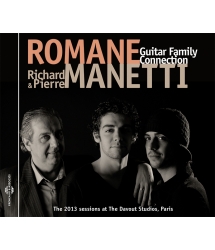
GUITAR FAMILY CONNECTION / STUDIO DAVOUST
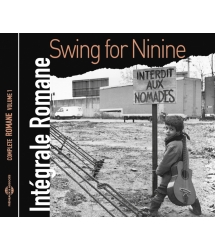
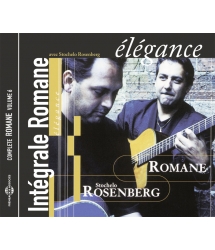
ROMANE & STOCHELO ROSENBERG
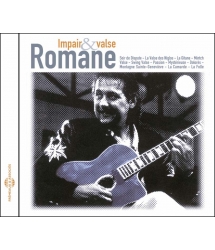
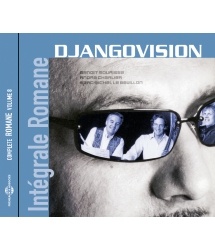





-
PisteTitleMain artistAutorDurationRegistered in
-
1Fill in GuitarRomane/Yayo Reinhardt/Fanto Reinhardt/Pascal Berne00:03:102002
-
2DanubeRomane/Yayo Reinhardt/Fanto Reinhardt/Pascal BerneTraditionnel00:03:102002
-
3TemporaryRomane/Yayo Reinhardt/Fanto Reinhardt/Pascal Berne00:03:272002
-
4Los del SurRomane/Yayo Reinhardt/Fanto Reinhardt/Pascal Berne00:04:082002
-
5Just for RhythmRomane/Yayo Reinhardt/Fanto Reinhardt/Pascal Berne00:03:002002
-
6Quartier BluesRomane/Yayo Reinhardt/Fanto Reinhardt/Pascal Berne00:03:202002
-
7SymphonieRomane/Yayo Reinhardt/Fanto Reinhardt/Pascal Berne00:02:132002
-
8Smile for YouRomane/Yayo Reinhardt/Fanto Reinhardt/Pascal Berne00:04:052002
-
9Envie de BohèmeRomane/Yayo Reinhardt/Fanto Reinhardt/Pascal Berne00:03:392002
-
10HungariaRomane/Yayo Reinhardt/Fanto Reinhardt/Pascal Berne00:02:532002
-
11OrientissimeRomane/Yayo Reinhardt/Fanto Reinhardt/Pascal Berne00:04:092002
-
12My One And Only LoveRomane/Yayo Reinhardt/Fanto Reinhardt/Pascal Berne00:01:512002
Acoustic quartet FA8510
Intégrale Romane Volume 7
Acoustic Quartet
1. Fill In Guitar (Romane) 3’06
2. Danube (trad. / arrgt. Romane) 3’07
3. Temporary (Romane) 3’24
4. Los del Sur (Romane) 4’05
5. Just for Rhythm (Romane) 2’57
6. Quartier Blues (Romane) 3’17
7. Symphonie (Django Reinhardt) 2’10
8. Smile for You (Romane) 4’30
9. Envie de bohême (Romane) 3’36
10. Hungaria (Django Reinhardt) 2’50
11. Orientissime (Romane) 4’05
12. My One and Only Love (G. Wood / R. Mellin) 1’51
ROMANE : guitare solo
YAYO REINHARDT : guitare rythmique
FANTO REINHARDT : guitare rythmique
PASCAL BERNE : contrebasse
Romane joue sur une guitare Dupont modèle «?Vieille Réserve?».
Yayo et Fanto jouent sur guitares Busato.
Enregistré en septembre 2002 au studio Big Bone
Réalisation, prise de son et mixage : Alexis Blanchart
Photo : Alexis Blanchart
Droits Master : Groupe Frémeaux Colombini SAS
Direction réédition Intégrale Romane :
Patrick Frémeaux avec Benjamin Goldenstein et Augustin Bondoux
Première parution en 2002 chez Iris music production
Frémeaux & Associés cessionnaire 2010-2016
Aller à l’essentiel.
Voilà ce qui semble dicter l’orientation prise par Romane sur cette galette. L’essentiel, c’est avant tout Django quand on joue du jazz dit «?manouche?». Mais la force de Romane vient de sa capacité à trouver sa propre voix dans un style qui frôle, voire dépasse bien souvent la caricature. Les sempiternelles reprises des «?saucissons?» à la sauce gypsy en sont la preuve. Romane a la spécificité de s’inspirer du maître, sans essayer de l’imiter ou de se lancer dans une énième version d’«?All of minor nuages de mes rêves?».
Bien sûr, le Monsieur excelle dans le domaine, mais il garde ça pour les boeufs ou rencontres improvisées. Depuis son premier CD, «?Swing for Ninine?», sorti en 1992, Romane demeure l’un des rares musiciens à proposer des compositions. Cet opus en est encore un bel exemple. Huit des douze titres sont signés du guitariste et joués pour la première fois. Deux morceaux sont quand même signés de Django. Il s’agit de «?Symphonie?», un morceau peu joué, enregistré en 1947 et du plus classique «?Hungaria?» que Romane reprend à son compte.
Mais revenons à l’essentiel.
Le défi de Romane n’est pas des moindres. Rester proche des racines, de l’esprit insufflé par Django en essayant de trouver d’autres voies, plus modernes. Autre particularités de Romane : savoir s’entourer et placer sous la lumière des musiciens d’exception. Lui qui a découvert la musique des gitans en l’écoutant dès son plus jeune âge, notamment à La Chope des puces de Saint Ouen, a su rendre la pareil en invitant des musiciens souvent peu connus. Ce fut le cas en produisant et en jouant sur le premier CD de Tchavolo Schmitt («?Alors voilà?»), en invitant Angelo Debarre sur «?Samois sur Seine?» à une époque ou peu de monde ne le connaissait…
Pour ce CD, il est allé dénicher les frères Yayo et Fanto Reinhardt. Originaires d’une famille de manouche d’Alsace, leur père «?Poro?» leur a enseigné la guitare rythmique, dans la pure tradition manouche, la pompe «?à la française?». Pas de relance, pas d’enrichissement. Une pompe droite, des accords simples, le tout au service du soliste. Mais quel swing !
La pompe, l’essence même.
En prenant les 2 frères à la pompe, Romane s’est offert un green anglais pour poser son jeu. Leur drive est impeccable. Métronomique. Du velours pour tout soliste. L’oreille ne perçoit qu’une seule et même pulsation. Mais avec une profondeur envoutante. Les deux guitares réunies donnent de l’ampleur au son, une pulsation organique. Moitié batterie, moitié guitare, elles propulsent et mettent en valeur les phrases de Romane. Aidée également par ce soutien rythmique magistral, la contrebasse de Pascal Berne prend des libertés. S’envole. Se libère du rythme pour survoler les morceaux. Romane, lui, libère la piste de décollage. «?Temporary?», composé par Romane en est un bel exemple. Aussitôt le thème envoyé à l’unisson avec la guitare, Romane s’écarte pour laisser Pascal Berne et sa «?grand-mère?» se propulser sur la rampe de lancement de Fanto et Yayo. Le démarrage est tout en glissades contrôlées, avant la reprise frénétique du tempo, puis son ralentissement pour mieux repartir. Romane n’a plus qu’à les rejoindre pour s’envoler avec eux. Un petit bijou… On peut être surpris d’une telle entente, sachant que les musiciens ne découvrent les morceaux que juste avant leur enregistrement. C’est du reste surement ce qui donne leur fraicheur à bien des titres.
Mais l’essentiel, c’est le son !
Le point central de cette galette reste la guitare de Romane. Déjà sixième album solo. La maîtrise est au rendez-vous. Celle du phrasé et du son. Le guitariste ne cherche plus la copie ou la démonstration technique mais la vibration, la note précise. Même au sein de ses compositions c’est la quête de la simplicité qui donne tant d’énergie à ces 12 titres.
Que ce soit pour les thèmes ou les solos, Romane démontre une grande facilité à faire swinguer une phrase, tout en conservant l’essentiel. La magie s’opérant grâce aux liaisons entre chaque note. Pour les solos, enregistrés pour la plupart en une prise, Romane ne se répète pas. Chaque phrase est liée à la précédente. Même s’il possède un style reconnaissable, il évite les plans.
Le placement rythmique est primordial. On retrouve cette aisance également dans ces compositions. Chaque thème parait évident. La respiration en est le moteur, comme sur «?Los del Sur?», où le thème paraît suspendu. Sur le swing implacable de «?Fill in guitar?», ou sur «?Orientissime?» aux accents classiques. Mais même au sein des reprises, Romane impose son style. C’est le cas du thème de «?Danube?», appelé également «?Les flots du Danube?» ou «?Anniversary Song?». Ce morceau, notamment joué par Django en 1947 et 1950, connait un regain d’intérêt grâce à la version proposée par Romane. Son phrasé et son placement rythmique donnent une autre couleur au morceau pour en accoucher d’une version reprise par la majorité des guitaristes amateurs d’aujourd’hui. Même chose pour «?Hungaria?» de Django se trouve «?Romanisé?».
Rendre hommage à Django sans le copier relève d’un véritable défi pour beaucoup de guitariste du genre. Certain pensent que cette musique commence et se termine avec Django. Romane parvient ici avec brio à prouver le contraire.
Christophe PILOT
www.djangostation.com
© Frémeaux & Associés 2014
Straight to the Essentials
Romane’s orientation on this disc seems dictated by the phrase above. The “essential” here is the name Django, especially when you play what they call “gypsy” jazz, but Romane’s strength lies in his ability to find his own voice while playing in a style that borders on caricature — and even often overtakes it. The proof of that statement is in those eternal guitar-versions of other ditties served with a gypsy sauce. But Romane remains specific in the inspirations he draws from the Master’s work: he never tries to copy him, or whip out just another “Minor Swing”…
Of course, Monsieur Romane excels in this domain, but he keeps it for jams and other improvised encounters. Ever since his first CD, Swing for Ninine (released in 1992), Romane has been one of the rare musicians to produce compositions of his own, and this opus is yet another fine example: eight of its twelve titles were penned by him and are played here for the first time. Even so, another two pieces bear Django’s signature: Romane’s performances of Symphonie, a piece not often played (it was recorded in 1947), and the more classical Hungaria.
But let’s get back to Basics
The challenge facing Romane was complicated, to say the least: on the one hand, to stay close to the roots, and on the other, to remain faithful to the spirit which Django breathed into his playing by finding other, more modern ways to play. Another of Romane’s specific abilities has been to know how to choose his accompanists… and put such exceptional musicians in the limelight. As one who discovered the gypsies’ music by listening to them from childhood, notably at the club La Chope des puces in Saint Ouen, Romane manages to return the invitation by choosing musicians who are often “unknowns”. Take the case of Tchavolo Schmitt’s first CD, Alors voilà, for example — he produced and played on it — where his guest on Samois sur Seine was Angelo Debarre: at the time, nobody knew who he was…
For the present album, Romane sought out two brothers, Yayo and Fanto Reinhardt. Both from a gypsy family in Alsace, their father “Poro” taught them to play rhythm guitar in the purest gypsy tradition, the one the French call “la pompe”, that typical “pumping” sound: no reprises, no embellishments, just straightforward, percussive, up-down strokes played extremely fast behind the soloist. But oh my, does it swing!
“Pump”, the very essence
When he chose these two brothers to pump out the rhythm, Romane gave himself a smooth tee to play his game: their drive is impeccable, like a metronome. A velvet surface for a soloist. The ear perceives one and the same pulse, but its depth is spellbinding. The two guitars together provide a very broad sound, an organic beat. Half-percussion, half-guitar, they propel Romane’s phrases to the forefront; and with the aid of this masterful rhythm-support, the double bass of Pascal Berne takes liberties, flying away, freed from the rhythm, to soar above these titles. As for Romane, he faces a clear runway, as on his own composition Temporary for instance: as soon as he states the theme, playing guitar in unison, Romane veers away to let Pascal Berne and his “grandma” move onto the launch-pad provided by Fanto and Yayo. They all take off in a controlled slide before the frenzied reprise of the tempo, and then its deceleration before launching into space again. And all Romane has to do is fly away alongside them. A little gem. You might be surprised by so much entente, given that the musicians only discovered these pieces just before recording them… But then again, that certainly has much to do with the freshness you can hear in these pieces.
But the essential is the sound!
Romane’s guitar remains the pivot here. This was already his sixth solo album, and it’s clear he’s lost none of his mastery. A master of phrasing and sound, the guitarist no longer had a thought for imitation or technical demonstration: what counted was vibration, the precise note. Even at the heart of his personal compositions, the quest for simplicity is the element which gives so much energy to these twelve titles.
Whether you look at the melodies or his solos, Romane shows remarkable ease in causing a phrase to swing while preserving the essential. The magic here operates thanks to the liaisons between notes. As for the solos, most of which needed only a single take, Romane doesn’t repeat himself. Each phrase is linked to the previous one; while his style is instantly recognizable, it avoids patterns.
The rhythm set-up is of prime importance. The same facility can also be found in the compositions, where each theme appears self-evident. Breathing is the engine, as on Los del Sur, where the theme seems suspended, or in the implacable swing of Fill in guitar, or again Orientissime and its classical accents. But even when the song is a “reprise”, Romane imposes his style: take Danube, also variously known as Les flots du Danube or Anniversary Song. This piece, which was notably played by Django in 1947 and in 1950, is currently drawing interest again thanks to the version proposed by Romane. His phrasing and rhythmical placing song lend another colour to the tune, and they give rise to a version which today’s amateur guitarists have picked up in their majority. The same goes for Django’s Hungaria, which has also been “Romane-ized”.
Paying tribute to Django without copying him is a challenge for any guitarist in the genre. There are those who still believe that this kind of music begins and ends with Django. But here, with brio, Romane proves the contrary.
Christophe PILOT
www.djangostation.com
Adapted into English by Martin DAVIES
© Frémeaux & Associés 2014
Romane est une figure de proue parmi ceux qui, à la charnière des années 2000, ont marqué d’un trait rouge le renouveau du jazz manouche. Son œuvre discographique est pour beaucoup dans l’évolution de cette musique et ses compositions sont devenues des classiques du genre. Sur Acoustic Quartet, Romane est royalement servi par les frères Yayo et Fanto Reinhardt, qui assurent une pompe métronomique, et par Pascal Berne à la contrebasse, dont le sens du swing est inénarrable. Le guitariste a le champ libre pour appliquer sa touche virtuose, son sens de la mélodie et prouve une nouvelle fois que, sous l’œil bienveillant de Django, le jazz à six cordes, a encore de beaux jours devant lui.
Augustin BONDOUX
«?Album après album, Romane démontre la vitalité d’une musique, d’un esprit, que d’aucuns croient devoir conjuguer au passé.?»
Romain GROSMAN - VIBRATIONS
Éditeur de l’intégrale discographique de Django Reinhardt de référence (40 CD, 760 pages de livrets), Frémeaux & Associés est aujourd’hui l’un des premiers producteurs indépendants de jazz manouche. Cette musique tant généreuse et accessible, que savante et technique, démontre la richesse culturelle et musicologique de l’apport du genre manouche à la culture occidentale. Romane en est l’un des plus éminents représentants et ses compositions sont devenues de véritables standards. Frémeaux & Associés célèbre l’œuvre du guitariste en recueillant l’ensemble de sa carrière phonographique afin de la remettre à la disposition du public dans une Intégrale, dont Acoustic Quartet est le septième volume.
Patrick FRÉMEAUX
Romane is a leading figure among those who, at the dawn of the 2000s, put their seal on the gypsy jazz renaissance. The evolution of this music owes much to his discography, and his compositions have become classics in the genre. On Acoustic Quartet, Romane is royally assisted by the brothers Yayo and Fanto Reinhardt, who lay down the metronome-steady beat the French call “the pump”, and by Pascal Berne on double bass, whose sense of swing is second to none. On guitar, Romane has a free hand to apply his virtuoso touch and feeling for melody, proving once again that, under the benevolent eye of Django, six-string jazz still has a fine future.
Augustin BONDOUX
“Album after album, Romane demonstrates the vitality of a music-style and frame of mind which some people thought could only exist in the past tense.”
Romain GROSMAN - VIBRATIONS
As the publisher of the complete recordings of Django Reinhardt — the set is a work of reference with 40CDs and booklets totalling 760 pages — Frémeaux & Associés today counts as one of the premier independent producers of gypsy jazz. This genre, as erudite and technical as it is generous and approachable, demonstrates the cultural and musicological richness of the gypsy contribution to western culture. Romane is one of their most eminent representatives and his compositions have become genuine standards. Frémeaux & Associés celebrates the work of this guitarist in a collection covering his entire career as a recording-artist, available to the public as a “Complete Works” set with Acoustic Quartet as its seventh volume.
Patrick FRÉMEAUX
